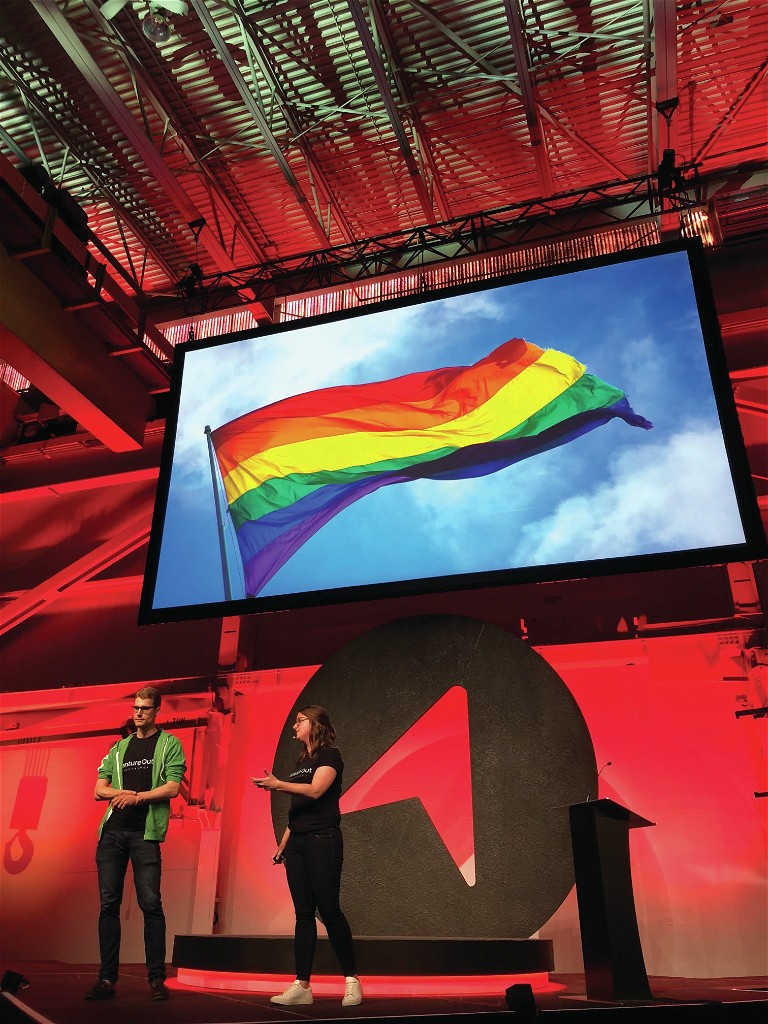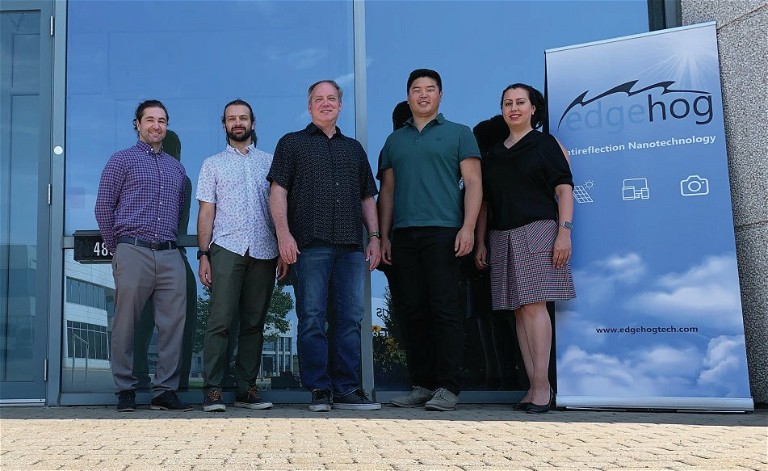Queering the Tech Ecosystem
Gay techies aim to create a more open, welcoming and diverse tech culture in Canada
By Matthew Bradford

Taylor Bond, co-founder of SaleesRight and sales leader at Box Hub, speaking at the True North Conference in 2018
To say the tech sector is a heteronormative boys club would be reductive, but to say people of all genders and sexualities are equally represented within it would be a stretch. Ultimately, the truth lies somewhere in the middle, and it’s thanks to tech-savvy entrepreneurs and community builders within the LGBTQ+ community that outdated codes are being rewritten.
“There’s a sense that the tech sector is still largely heteronormative and run by white, cisgender men,” says Naoufel Testaouni, co-founder and CEO of QueerTech, a Montreal-based non-profit that aims to queer the tech ecosystem. “I remember walking into tech companies or groups in 2015 and barely finding any women in the room, let alone people who would openly identify as LGBTQ2SA+!”
While progress is being made, there is room for stronger representation among LGBTQ+ demographics in tech as in other sectors. At last count, QueerTech research indicated that a surprising 54 per cent of LGBTQ+ people still are in the closet at their work. These are individuals who continue to feel uneasy about sharing their personal lives in a predominantly straight environment or are worried that their sexuality will impede their careers.
“There are a lot of reasons why people don’t want to bring their authentic selves to work,” says Testaouni, adding that this can even affect their career trajectory. “What happens is that people end up moving between jobs a lot because they don’t want to reveal themselves. That impacts how they evolve in a certain industry, and the tech industry is a great example of where that can happen.”
It was the firm belief that more needed to be done to engage and retain gay talent in the tech sector that motivated Testaouni to launch QueerTech in Canada in 2016. “The inspiration for QueerTech came when I met my (now) co-founder Andy Saldana, who was already running a group called QueerTech meetup group in New York City,” explains Testaouni. “We decided to start a similar group in Montreal and to see if we could build an LGBTQ2SA+ community that would start a conversation around the issues we face in the tech industry.”
The first QueerTech meetup launched as a town hall within Shopify’s Montreal office. It attracted a crowd of tech talents from the LGBTQ+ community who were interested in meeting peers and sharing their experiences. Over the years, the organization has grown to 6,000 members from across Canada. While its organizers feared the COVID-19 pandemic would bring the initiative to a halt, the decision to go virtual over the last 18 months has only spurred its growth.
“As we moved on with our program virtually, we were surprised to see a huge spike in membership growth from the rest of Canada,” Testaouni reports. “In the past year, we’ve seen people come from Ottawa, Toronto, Vancouver and all over Atlantic Canada. That really showed us there is a need for this community, whether it’s in-person or remote.”
SETTING THE STANDARD
QueerTech isn’t alone in its mission to champion diversity and inclusion within tech. Entrepreneurs like Taylor Bond, co-founder of SalesRight and sales leader at Box Hub, are also doing their part to create a more welcoming playing field, often through initiatives and collaborations with QueerTech.
Like many industry veterans, Bond admits that he too was once reluctant to bring attention to his sexuality when starting out in tech. The “bro culture” was alive and well within the venture capital landscape, he says, and he had a hard time engaging with that culture. “I had to go to networking events where, frankly, I just didn’t have much in common with a lot of the people there,” explains Bond. “Getting venture capital is so much about building relationships, but it was tough to find common ground and shared, lived experiences to build rapport. So there were definitely barriers.”
Bond also acknowledges that LGBTQ+ entrepreneurs, as well as visible minorities, have a history of being under-represented in the sector. “The tech industry is still very male-dominated, and for a long time, equityseeking communities – whether it’s women, refugees, black, LGBTQ2S+ – have been severely under-indexed,” he says.

Calvin Cheng, second from right, with his team at Edgehog, a nanotechnology firm he founded in 2017
Bond used these early experiences as motivation to pivot the culture from within. In 2016, he started Gradient Spaces, an LGBTQ+ inclusion non-profit organization for innovators, which he led for four years. “I remember when we were hosting our first conference for Venture Out, and speakers from the industry who were publicly out or willing to talk about their sexuality were few and far between,” he recalls. “Now it’s been incredible to see all the improvements that happened over the past five years, and to see more people bringing their authentic selves to work and talking more openly about their backgrounds. That’s good for their careers and empowering for future generations.”
Venture Out was Canada’s first LGBTQ+ inclusion non-profit organization for early-stage professionals in tech and entrepreneurship. Since launching in 2016 it has broadened its mandate to encompass a broader social impact framework.
Calvin Cheng is another gay tech professional who is effecting change from within. In 2017, he founded Edgehog, a firm that uses licensed, anti-reflection glass technology from the U.S. to enhance solar panel technology on spacecraft, among other applications. For Cheng, the advantage of building a company from the ground up was the ability to establish a culture of inclusion and diversity at its foundation. “As the founder, I get to set the tone,” he says. “And here, that means creating a place where everyone’s ideas are welcome, and we all feel accepted and respected.”
Cheng stresses that while he never ran up against overt barriers himself in the tech industry, he recognizes that some firms can do more to show they believe in diversity, equity and inclusion (DEI). “Sometimes it just comes down to subtle clues in the environment like pride flags in the office or events that recognize women entrepreneurs,” says Cheng. “As a business leader, anything you can do to show employees that it’s OK to be yourself, or that’s it’s OK to be ‘out,’ goes a long way.”
Testaouni, Bond and Cheng are all on different paths in their tech careers. Common to all three, however, is a firm belief in the power of community, be it through initiatives like QueerTech, Venture Out and Gradient Spaces, or through the culture they create at their own start-ups. “To have a community where you can talk to like-minded people, share stories and compare notes is valuable,” says Cheng. “It’s an important resource, especially for people early into their career who may not feel comfortable in their skin or are not sure if they should come out.”
Adds Bond: “Our goal is to keep communities like these alive so that the next generations can experience fewer struggles and be able to bring their full selves to the field.” ■